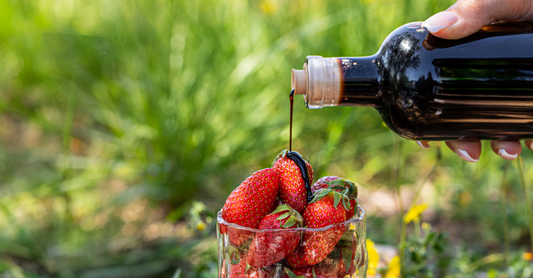Bergamot , a delicate fruit from the citrus family, is often confused with its cousin, the lemon. Native to the Mediterranean region, it is cherished for its distinctive aroma and tangy taste. In cooking, bergamot is a versatile ingredient , used in a variety of recipes . It brings a unique aromatic note to pastries, cocktails , herbal teas , and even savory dishes. The essential oils extracted from its peel are also highly prized in perfumery for creating fragrances.
Particularities and characteristics of bergamot lemon
Bergamot lemon is prized for its sweet, fragrant flavor, which is somewhere between lime and bergamot. The fruit's peel, or zest , is used to infuse exquisite flavor into dishes, particularly in Asian and Italian cuisine . Bergamot lemon juice, rich in vitamin C and antioxidants , can be used to make refreshing drinks like lemonades or iced teas. It is also ideal for making salad dressings, sorbets, or ice creams. Bergamot lemon has digestive properties and is often consumed as an infusion after a meal. Finally, bergamot lemon is an organic fruit , grown without the use of pesticides or chemical fertilizers, making it a healthy and environmentally friendly choice.
Preparing bergamot lemon for consumption
When it comes to cooking , and particularly Mediterranean cuisine , bergamot lemon is a must. This citrus fruit, with its exceptional aromatic richness, is often used in baking or in the preparation of cocktails by mixologists.
Choosing and buying a quality bergamot lemon
When purchasing, it is essential to choose an organic bergamot lemon , as pesticides can alter the taste and properties of the fruit. In addition, a quality lemon should have smooth, shiny skin, free of spots and mold. It is best to buy it between November and February, during the harvest period. The fruits should be firm to the touch, but not hard. They should give off a fresh, lemony fragrance .

Preparing and cutting the bergamot lemon
The first step in preparing bergamot lemon is to wash it well to remove any possible residue. Then, you can cut it in half and extract the juice, rich in vitamin C and antioxidants , to make a detox lemonade or a seasoning for a fruit salad. For lovers of Asian or Italian cuisine, the finely grated zest of bergamot lemon enhances fish dishes, risottos or sorbets. The zest can also be incorporated into cake or cookie dough for a delicious lemony flavor. Finally, let's not forget that bergamot lemon can be used to prepare digestive herbal teas, or even fragrant infusions. Thus, this multifaceted fruit finds its place in many recipes and offers a wide range of culinary possibilities.
Consumption of bergamot lemon
Bergamot lemon , a citrus hybrid with lemon and bergamot aromas, is a prized fruit in Mediterranean cuisine. Rich in vitamin C and antioxidants, it is both aromatic and beneficial to health. Its unique flavor and captivating fragrance make it a favorite ingredient in many recipes, from cocktails to pastries to savory dishes.
Enjoying raw bergamot lemon
Bergamot lemon , this exotic citrus fruit, is best enjoyed raw, whether in a fruit salad or as fresh juice. Its juicy flesh and balanced acidity offer a touch of freshness and tonicity . Lemon zest, loaded with essential oils , is also used to flavor various culinary recipes. In addition, raw bergamot lemon aids digestion , strengthens immunity and contributes to the detoxification of the body. To fully benefit from its benefits, it is best to choose organic fruits, harvested when ripe.
Using Bergamot Lemon in Cooking
In cooking, bergamot lemon is prized for its distinctive aroma that enhances flavors. It is commonly used in Italian and Asian cuisine for its acidity and unique flavor. Chefs and pastry chefs use it to flavor cakes, sorbets, and other desserts. Bergamot lemon zest, fragrant and slightly bitter, is often incorporated into cake batters, jams, and preserves. Bergamot lemon has its place in beverage preparation: its juice is used in refreshing drinks such as lemonade or lemonade, and it is also used by mixologists to concoct exquisite cocktails. Finally, as an infusion or herbal tea, bergamot lemon adds a pleasant aromatic note and aids digestion.
Preserving Bergamot Lemon
Bergamot lemon , the fruit of the union between lemon and bergamot, is a citrus fruit prized for its captivating fragrance and unique aromatic taste. It is a fruit rich in vitamins, particularly vitamin C , and antioxidants, making it an excellent ally for health. Storing bergamot lemon requires some special attention to preserve its precious nutrients and distinctive aroma.
Store bergamot lemon in the refrigerator
The most common method for storing bergamot lemons is to place them in the refrigerator. The cold helps slow the natural deterioration of the fruit, thus extending their shelf life. It is recommended to store them in the vegetable drawer of your refrigerator, where the temperature is more stable. In these conditions, bergamot lemons can be stored for two to three weeks. However, it is best to consume them quickly to fully enjoy their nutritional benefits and unique flavor.
Preserving bergamot lemon through the drying process
In addition to refrigeration, bergamot lemons can be preserved by drying them. This method removes moisture from the fruit, slowing down decay and preserving their flavor. Drying bergamot lemon peels is particularly popular in culinary applications, especially in baking and Asian cuisine. The dried peels can be used to flavor a variety of dishes, drinks like lemonade or herbal tea, and even desserts like cakes and sorbets. They are also a concentrated source of vitamin C and antioxidants. To dry bergamot lemons, simply zest the fruit and place the peels on a baking sheet in a low-temperature oven until completely dry.
Benefits and Warnings of Bergamot Lemon
Bergamot lemon is not only a versatile culinary ingredient, but also an inexhaustible source of health benefits. Belonging to the citrus family, it is rich in vitamin C and antioxidants , making it valuable for strengthening the immune system. Its juice, consumed in drinks such as lemonade or infusion , is known to aid digestion . In addition, its essential oils, extracted from its zest, have an aromatic scent used in aromatherapy for its relaxing and soothing properties.
The Health Benefits of Bergamot Lemon
Consuming bergamot lemon, whether in juice or zest, is beneficial for your health. Its rich vitamin C content helps strengthen the immune system, helping our bodies fight infections. The antioxidants it contains help neutralize free radicals in our bodies, reducing the risk of chronic diseases. Bergamot lemon is also known for its detoxifying properties. It aids digestion and helps eliminate toxins from our bodies. Furthermore, as a fiber-rich fruit, it can help regulate bowel movements and prevent constipation.
Precautions to take when consuming bergamot lemon
Despite its many benefits, it's important to consume bergamot lemon in moderation. Its acidity can irritate the stomach, especially in people suffering from gastrointestinal disorders such as ulcers or gastroesophageal reflux disease. It's also best to choose organic bergamot lemons to avoid pesticide residue. Finally, when using the zest in cooking or baking, be sure to wash it thoroughly to remove any impurities or wax residue. To fully enjoy the benefits of this Mediterranean fruit, balanced and conscious consumption is recommended.








 lucangeli.it
lucangeli.it